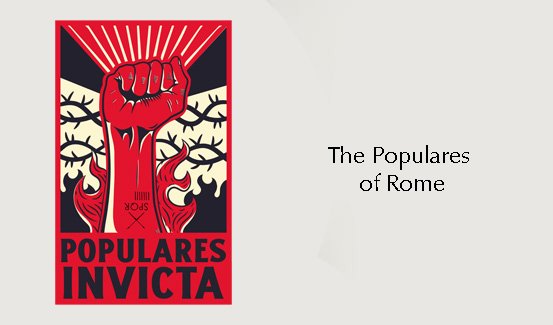The Populares of Rome
The Populares were a political faction in the late Roman Republic (133-27 BC) that was made up of politicians who sought to champion the cause of the common people, or populus, against the interests of the wealthy elite, or optimates. The term “Populares” comes from the Latin word populus, which means “people.”
The Populares emerged as a political force in the late 2nd century BC, and their leaders included figures such as Tiberius Gracchus and Gaius Gracchus, who sought to address the growing economic and social inequality of the Roman Republic. They proposed a series of reforms aimed at redistributing land, limiting the power of the aristocracy, and improving the lives of the poor.
The Populares drew their support from the urban and rural poor, who were often excluded from political power in the Roman Republic. They also had the support of the equestrian class, which was made up of wealthy merchants and businessmen who were often at odds with the aristocracy.
However, the Populares were opposed by the Optimates, who represented the interests of the wealthy landowners and aristocrats. The conflict between the two factions ultimately led to a series of civil wars and the downfall of the Roman Republic, as the power of individual generals and military leaders grew at the expense of the traditional political institutions.
There were several important leaders of the Populares faction in the late Roman Republic. Some of the most notable Populares were:
Tiberius Gracchus: Tiberius was a Roman politician who served as a tribune of the plebs in the late 2nd century BC. He is known for his attempts to redistribute land to the poor and limit the power of the aristocracy. He was assassinated in 133 BC by a group of senators who opposed his reforms.
Gaius Gracchus: Gaius was the younger brother of Tiberius and also served as a tribune of the plebs. He proposed a series of reforms aimed at improving the lives of the poor, including the distribution of grain at a subsidized price and the establishment of public works programs. He was also assassinated in 121 BC.
Julius Caesar: Julius Caesar was a Roman general and statesman who came to power in the late 1st century BC. He is often considered a member of the Populares faction, as he championed the interests of the common people against the aristocracy. He introduced a number of reforms aimed at improving the lives of the poor, including the expansion of citizenship and the reduction of debt.
Publius Clodius Pulcher: Clodius was a Roman politician who served as a tribune of the plebs in the mid-1st century BC. He proposed a number of reforms aimed at increasing the power of the plebeians and limiting the influence of the aristocracy. He is also known for his scandalous affair with Julius Caesar’s wife, which caused a major political scandal.
The key demands that were associated with the Populares were varied but these are some of the key issues:
-
Land Reform: Tiberius Gracchus, a Roman politician who served as a tribune of the plebs in the late 2nd century BC, proposed a series of land reforms aimed at redistributing land to the poor. He argued that large landowners were monopolizing the best land, leaving small farmers with poor-quality plots or no land at all. Tiberius proposed that land be redistributed to the poor in smaller allotments.
-
Grain Subsidies: Gaius Gracchus, the younger brother of Tiberius, proposed a series of reforms aimed at improving the lives of the poor. One of his proposals was the distribution of grain at a subsidized price. This was aimed at ensuring that the urban poor had access to affordable food.
-
Citizenship: The Populares faction supported granting Roman citizenship to certain groups who were not traditionally eligible, such as the residents of Roman colonies or the allies of Rome. This would have given these groups greater political power and representation. Julius Caesar, a prominent member of the Populares faction, proposed the extension of citizenship to more people, which was eventually granted after his death.
-
Military Reforms: The Populares supported military reforms that would have given greater benefits to soldiers, such as better pay and the possibility of land grants after their service. Julius Caesar was known for his military reforms, which aimed to improve the conditions of soldiers and create a more professional army.
A rough timeline of some of the key events and figures associated with the Populares faction in the late Roman Republic:
- 2nd century BC: The Populares faction emerges in Rome as a group of politicians who seek to champion the interests of the common people against the wealthy elite.
- 133 BC: Tiberius Gracchus is elected as a tribune of the plebs and proposes a series of land reforms aimed at redistributing land to the poor. He is assassinated by a group of senators who oppose his reforms.
- 123-122 BC: Gaius Gracchus serves as a tribune of the plebs and proposes a series of reforms aimed at improving the lives of the poor, including the distribution of grain at a subsidized price and the establishment of public works programs. He is also assassinated by his political opponents.
- 107-100 BC: The Social War, a conflict between Rome and its Italian allies, takes place. The Populares faction supports granting Roman citizenship to the allies, while the Optimates oppose it.
- 63 BC: Julius Caesar is elected as pontifex maximus, the highest religious office in Rome. He uses his position to advance his political career and promote the interests of the common people.
- 58-50 BC: Julius Caesar serves as governor of Gaul and expands the territory of the Roman Republic through a series of military campaigns.
- 49-44 BC: Julius Caesar becomes involved in a power struggle with his political rivals, including the Optimates faction. He is eventually declared dictator for life in 44 BC, but is assassinated by a group of senators who fear that he is becoming too powerful.
- 44-42 BC: Mark Antony, a former lieutenant of Julius Caesar, allies with the Populares faction and engages in a power struggle with Caesar’s assassins, including Brutus and Cassius.
- 44-31 BC: The Roman Republic is replaced by the Roman Empire under the rule of Julius Caesar’s adopted son, Octavian (later known as Augustus). The Populares faction gradually loses influence as the political system is restructured under the new regime.
The Populares faction in the late Roman Republic had some success in achieving their demands, but their movement ultimately failed to bring about significant and lasting change.
Some of the key demands associated with the Populares, such as land reform and grain subsidies, were implemented to some extent during the late Republic. For example, Tiberius Gracchus’ land reforms were passed and land was redistributed to the poor. Gaius Gracchus’ grain subsidies were also implemented and provided some relief to the urban poor.
However, the Populares’ demands for citizenship and military reforms were more controversial and faced greater resistance from the aristocracy. Although Julius Caesar was able to extend citizenship to some groups after his death, the Populares were not able to achieve their broader goal of giving greater representation and power to the common people.
Furthermore, the Populares’ movement was ultimately undermined by political infighting, violence, and the rise of authoritarian leaders like Julius Caesar. The Roman Republic was eventually replaced by the Roman Empire, which centralized power and diminished the influence of popular movements.
Overall, while the Populares had some success in achieving their demands, their movement ultimately failed to create a more just and equitable society in the long term.











1 Comment
Comments are closed.